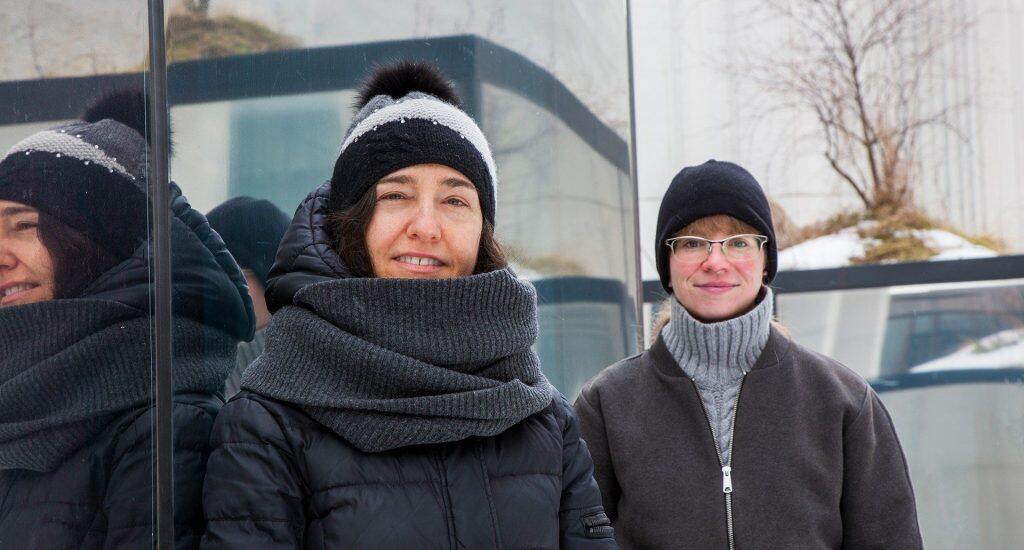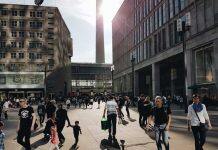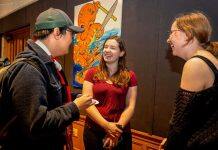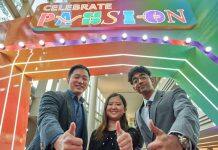A growing body of evidence reveals the negative effects of competitive pressures on university scholars’ quality of life, teaching and research. It’s a reality that leaves many academics questioning their roles in higher education.


Stacey Cann (MA 12) and Victoria Stanton (BFA 95, Cert 96), doctoral students in Concordia’s Department of Art Education, are giving academics an opportunity to pause and reflect on alternatives to the current pace and practice of scholarly life.
Cann recalls a fellow graduate student saying, “I would love to slow down, but I don’t know how I’d be able to do it in a PhD program.”
This made Cann wonder — when is slowing down possible? “It is important to take steps toward thinking about this as a group, not just by yourself,” she says.
Sparked by exchanges like this, last fall Cann and Stanton launched the Bureau of Noncompetitive Research, which aims to build a healthier professional structure in which to do research.
“This is about turning our critical eye to the culture of research: meaningfully, sensitively, from a human perspective, not an industry perspective,” Stanton says.
‘Creating novel spaces to learn’
In fall 2021, the bureau hosted the virtual series Slowness and the Institution: Doing Research Differently, with support from Concordia’s Centre for the Study of Learning and Performance (CSLP).
The public conversations featured international artists, educators and academics who explored connections between the slow movement — which advocates decreasing life’s pace — and artistic production, interdisciplinary practices and academic and art-world institutions. The conversations featured divergent viewpoints on many types of methodologies for “slowness.”
Recordings of these talks are available on the CLSP’s YouTube channel.
“It was so interesting for us to hear these themes around slowness articulated through a range of lenses. They had similar themes but with singular orientations; this created a breadth of perspectives,” Stanton reports.
Cann and Stanton believe the series resonated deeply with its audiences, drawing researchers from a variety of disciplines, all of whom expressed gratitude for a space to question their current work climate.
“I am so pleased that the centre had the opportunity to host the bureau’s innovative conversation series,” says Vivek Venkatesh, director of the CSLP and professor of Inclusive Practices in Visual Arts in Art Education.
“This is especially true as we look toward creating novel spaces to learn with and from our highly regarded graduate artists, thinkers, philosophers and researchers.”
‘When people work cooperatively, they come up with better ideas’
Cann and Stanton’s article “Talking Cure: Dialogue as Collaborative Resistance” in the latest issue of the magazine esse arts + opinions responds to the issue’s theme of collectives.
“I think when people work cooperatively, they come up with better ideas,” Cann says.
“When we overemphasize competitiveness and the speed of getting things done, there’s no longer space for that. In reality, Victoria and I are competing for a limited amount of funding. The bureau is about creating a place where we can think together rather than compete with one another.”
The project isn’t about opting out or rejecting the university as an institution, Stanton adds; it’s about returning to the original principles of the university as a place to sound out ideas, look over one another’s output, get feedback, have diverging opinions and think about the nature of academic work — without the pressure of the current neoliberal model.
‘When is action urgently needed, and when do we need to stop and listen?’
Cann and Stanton believe a slow approach can also address the polarized culture seen both on and off campus.
“It allows us to stop and consider opposite points of view rather than immediately engage in an attack and defense of our own,” Cann says.
Part of the exercise is to cultivate a discernment of time, Stanton adds. Slowness can also be problematic — for example, if an institution were to intentionally slow down much-needed change.
“When is action urgently needed and when do we need to stop and listen? It’s not one at the expense of the other; it’s about, when does one or the other really make sense,” she says.
This kind of applied intellectual work is very much in keeping with the work of the CSLP, says Venkatesh.
“Stacey and Victoria’s work shows how we can remain inclusive of the multiplicity of voices in an era that values the hollow resonance in silos at the expense of the pursuit of knowledge.”







































